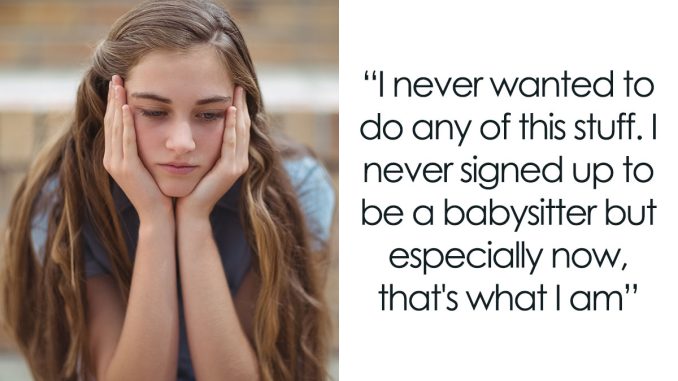
Parents are the people that are supposed to guide a person through their first steps of adulthood and lift them up when needed. They should be there for their children when they have questions and doubts and build them up in a way that makes them kind and confident adults. Many do their best to help their children flourish. However, even the best of intentions don’t always get you what you want.
One could argue that the parents from @Narrow-Syrup1428’s story had great intentions. They wanted their eldest to learn some responsibility while building a strong bond with the step-sister. As a benefit, they would also be relieved of some of their parenting duties. Everyone wins, right? Not quite. Read on to discover how it all went down and why the redditor turned to r/AITA for advice.
Older siblings can often get the task of keeping an eye on the younger ones when they’re around
Image credits: Wavebreakmedia (not the actual photo)
The girl in this story, however, was given way more serious responsibilities way too early in life
Image credits: akimovanadezhda (not the actual photo)
Image credits: LightFieldStudios (not the actual photo)
Image credits: Narrow-Syrup1428
Image credits: Steve Lieman (not the actual photo)
What this redditor is describing sounds an awful lot like parentification. That is a parent-child dynamic in which the child assumes caregiving responsibilities while the parents fail to support them and restrict their independence. This seems exactly like what the parents in this situation did by giving their daughter no choice but to take care of her younger step-sister.
That is why it’s no wonder that an overwhelming majority of fellow redditors took her side in the situation. Many commentators were frustrated over the actions of the girl’s parents and pointed out that they have robbed her of her childhood.
Redditors also pointed out that the parents completely ruined a potentially good relationship that the step-sisters could have had if not for their interference. If the needs of the older girl were considered and her care for her sister was a voluntary contribution, they might have built something meaningful together. It could have resulted in a mutually beneficial relationship. Instead, as the OP’s anger over the burdensome care grew, her ability to love and relate to her sister was diminished. When she thinks of her step-sibling now, she doesn’t see her as someone she could relate to, someone that could be her confidant. She sees a responsibility that she did not want or was capable to take on.
One also has to remember that this big responsibility was hoisted on her shoulders around two years after the girl’s mother died. Adjusting yourself after such a big loss and, soon after, becoming part of a blended family is already hard enough. Furthermore, she was also only ten years old, so coping with such life-defining events and emotions in her life must have been tough, even without the added responsibility. Sounds like her parents couldn’t provide support for that either.
Parentification might have some benefits but the harm to the child’s development can be significant, too
Image credits: cottonbro studio (not the actual photo)
It is important to note that giving a child appropriate care responsibilities is not necessarily harmful. Scientists think that it can actually have positive long-term effects and build character and resilience. This, however, is only valid in cases when the responsibilities in question are age-appropriate, monitored, acknowledged, and supported. This doesn’t seem to be the case for the OP. The responsibilities that were entrusted to her were too much for such a young child that was already going through a lot. No wonder the resentment was quick to build.
Researchers theorize that the parentification burden is especially heavy on adolescents as parents tend to expect more from them than younger children. Parents might ask their teenagers to take on tasks that they are still not fully equipped to handle and leave them to it without providing any support or supervision. This is the time, however, when teens are still learning social and cognitive skills that are necessary to be a caretaker. This can lead to them growing up too fast and becoming too independent too quickly.
The overall negative effects of parentification on adults can be quite significant. It can result in low self-esteem, psychological distress, attachment issues, personality disturbances, and more. The negative impact is usually more prominent in adults that were parentified emotionally, i.e., those that were subjected to dealing with a parent’s emotions at a young age. Those that were parentified instrumentally, i.e., took on household responsibilities and became caretakers for other family members, have more of a chance of benefiting from parentification.
Another important thing to note is that parentification is a cycle. Parents that subject their children to it have experienced it themselves when they were young. As they do not process it correctly and heal from this trauma, they continue the habit by putting responsibilities on their children. That is why it is important to identify what you have gone through and seek professional help.
Hopefully, the OP can get herself out of this situation and regain her much-needed independence. Then, she’ll be able to seek counseling to process the consequences of it.
Many redditors showed support for the girl. She provided extra details on the situation in the comments
People deemed her NTA and here’s the rest of the discussion
The post “What I Wanted Wasn’t Important”: Teen Resents Babysitting Her Special Needs Stepsister, Loses It first appeared on Bored Panda.
